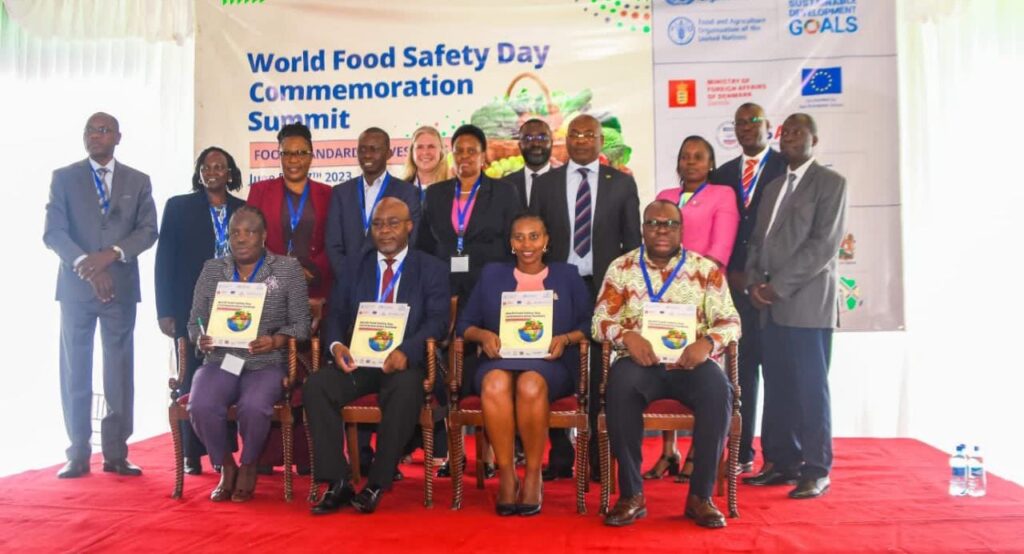
BY NJOKI KARANJA
The United Natioms General assembly adopted a resolution in 2018 declaring June 7th as the World Food Safety Day (WFSD) celebrations . This annual event aims to raise awareness of food safety’s importance and promote action to prevent, detect and manage foodborne risks.
In commemoration of the 2023 World Food Safety Day (WFSD), the African Union Commission, East African Community, the Government of Kenya, TradeMark Africa, MESPT, and Partners organized an event from 5 to 7 June 2023 in Nairobi, Kenya to raise awareness on food safety. The meeting was held under the theme “Food Standards Save Lives”. The objectives of the summit were to:
i. Raise awareness of the importance of food safety and to promote action to prevent, detect, and manage foodborne risks.
ii. Provide a platform for sharing experiences and best practices on implementation and compliance with food safety standards and measures.
iii. Foster collaboration and partnerships among stakeholders to amplify the impact of food safety interventions in Africa.The Summit brought together 220 participants from 30 African Union member states, 2 RECs (EAC, ECOWAS), AUC, and Development Partners (EU, USAID, DANIDA).WE the Member States of the African Union, Regional Economic Communities, Development Partners, Food Producers, Processors, Marketers and Consumers.
RECALLING the momentum created from the previous World Food Safety Day celebrations, and desirous of collaborating in unison to focus efforts on reaching state and non-state actors as well as those directly involved in food systems on the continent in order to raise the profile of food safety.
RECOGNIZING that foodborne diseases make 91 million people ill and cause 137,000 premature deaths annually in Africa and that this translates into productivity losses of US$95 billion a year in developing countries alone;
COGNISANT that application of, and compliance with, food standards is a critical factor to promoting safe food value chains and reducing the public health and socio-economic impacts of the high foodborne disease burden in Africa.
AWARE of the need to promote safe trade in food to realize the continental objectives of ending hunger and tripling intra-African trade in agricultural commodities and services by 2025.
RECOGNIZING the importance of food standards and risk-based food safety measures in assuring the safety and quality of food products for public health protection and trade facilitation.
MINDFUL of the peculiar challenges the Member States face in the development, enforcement, and compliance with risk-based food safety measures.
ACKNOWLEDGING that by enhancing investment, fostering strategic partnerships, and promoting collaborations, we can establish and operationalize functional and resilient national food control systems that safeguard the health of consumers and promote safe trade.
HEREBY call for the following actions:
- Enhance participation in international standard-setting bodiesImprove AU member states’ engagement in international standard-setting bodies to contribute effectively to the development of food safety standards.
2. Increase investment in food safetyInvest more in food safety, including capacity building for value chain actors, to manage risks and ensure compliance with food standards.
3. Improve surveillance and monitoring systemsEnhance and sustain foodborne disease surveillance and monitoring by improving laboratory capacity, data collection, analysis, and reporting.
4. Promote research on food safetyEncourage and support research initiatives focused on developing new technologies, methodologies, and best practices to enhance food safety management systems and mitigate foodborne risks.
5. Support policy implementationSupport the implementation of continental, regional, and national food safety policies, frameworks, and strategies.
6. Strengthen regulatory mechanismsDevelop and enforce robust food safety policies, regulations, and standards to enhance regulatory mechanisms.
- Promote collaborationFoster regional and continental collaboration among African Union member states to enhance food safety practices, facilitate trade, and establish partnerships and knowledge-sharing networks.
8. Establish public-private partnershipsEncourage strong partnerships between the public and private sectors to promote knowledge transfer, technology adoption, and joint initiatives in food safety throughout the value chain.
Food is an essential part of what it means to be human. Improving food safety requires sustained investment in several areas from stronger regulations to better coordination, better laboratories, more stringthen surveillance and better training and education among others.
“For the last 5 years MESPT through the financial support from the European Union and the Royal Danish Embassy has been implementing a food safety system for value chain as part of the larger AGRIFI programme.” Said Rebecca Amukhoye MESPT CEO.
In conclusion food standards contribute to the safety and quality of local and international food trade and prevent unfair trade.

More Stories
NEMA Conducts Public Forum on Draft E-Waste and Environmental Assessment Regulations
TVET and Micro-Credentials Key to Youth Employment, Says Dr. Ekrah Ndung’u
NATIONAL LAND COMMISSION CEO JOINS COUNTY FIRST LADIES FOR LAUNCH OF 2025–2028 STRATEGIC PLAN**